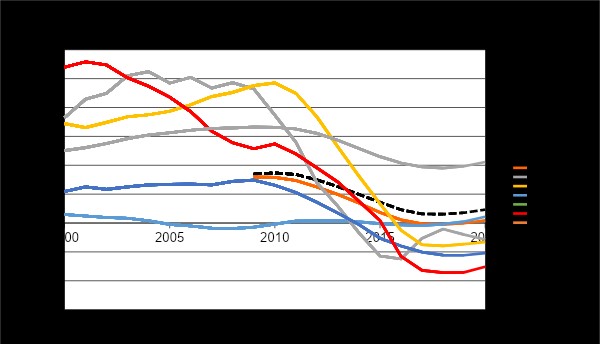Find all related Progressive Post
Progressive Post

The Covid pandemic has drawn new attention to the key importance of personal services for household survival, ranging from food delivery to care services. But all too often such services are provided by precarious workers, often employed via online platforms.
Platform work is widespread across Europe and growing rapidly, research funded by the European Foundation for Progressive Studies (FEPS) and UNI-Europa reveals. Surveys in 13 European countries, carried out by the University of Hertfordshire with Ipsos MORI, found that the proportion of the workforce finding work via platforms such as Upwork, Uber, Deliveroo or Myhammer ranged from around one worker in 20 (in Sweden and the Netherlands in 2016) to over a quarter in Czechia in 2019. In the UK, platform work doubled between 2016 and 2019. Since the Covid-19 outbreak, there has been further growth, especially in delivery services.
Platform work is at its highest where earnings are lowest. In more than nine out of ten cases, those doing platform work are using it to top up income from other sources. Being a platform worker is not their primary identity and some feel that it is stigmatising even to admit to doing it. Nevertheless, their willingness to undertake this kind of precarious work lowers the bar for others. The demand for platform services is especially strong among full-time workers, including many in low-income households. On average nine out of ten of those who work via platforms providing taxi and delivery and 84 per cent of those who provide platform-based household services are also customers for these services. It seems that many of the millions of Europeans who use platform services are buying ready-cooked meals, cleaning or care services in the market because they simply do not have the time to do this work themselves. Platforms form part of a vicious cycle whereby the need for extra income leads to working longer hours which leaves less time available for housework, leading to greater use of platforms which, in turn, increases precarious work still further. The challenge for Social Democrats is how to break this cycle.

Current platform labour practices undoubtedly represent part of a general degradation of work: another threat to the decent employment standards painstakingly put in place across Europe in half a century of social dialogue. A knee-jerk reaction is to try to put back the ingredients of this standard employment model – job security, clear occupational identities, a standard working week, and full social protection – and to bring the platforms under the scope of tax and regulatory regimes. But such demands position Social Democrats as people who want to turn the clock back: old-fashioned politicians on the side of rigidity and bureaucracy who are trying to hold back unstoppable forces and do not want to encourage innovation or progress.
Meanwhile, the employment model is not the only feature of the mid-20th century welfare state that is at risk. European governments are facing multiple challenges including an ageing population (leading to increased demand for care and other household services), growth in two-earner households (with less time available for household work), and a reduction in the supply of public services because of cost constraints and, in some countries, austerity policies.
Could it be that instead of seeing digital platform technologies as a threat to the old welfare state model we might instead treat them as building blocks for a new kind of welfare state, fit for the 21st century, that addresses some of these challenges?
It is true that as presently constituted, online platforms are often run by global corporations that put nothing back into the communities in which they operate, but extract a large rent from each transaction. All they contribute is poor working conditions, income insecurity, and forms of digital surveillance and control that threaten individual liberty. But what if they could be developed under different forms of control, in ways that are democratically accountable, and under conditions that guarantee decent working conditions and job security?
The ability to match supply and demand for services in real-time that platforms enable could provide a key to making our public services more efficient and sensitive to user demands. Using modern technologies to deliver services in new ways might change their form but could, perhaps, bring them more closely into alignment with the fundamental aims of welfare states: to provide the wherewithal to ensure that all citizens obtain the basic services that enable them to live dignified, safe, and healthy lives and bring up their children free from the blight of poverty.
Public platforms could be integrated with existing public services to make them more efficient and responsive to citizens’ needs – for example for transport to medical appointments, meals on wheels for the housebound, emergency childcare services, or care for people with unpredictable medical needs. Savings could be achieved by delivering services only when they are actually needed on a just-in-time rather than a just-in-case basis. Devices such as voucher schemes could make it possible to integrate services provided free or at a discount on the basis of social need with commercial services. New forms of public-private partnerships and social enterprises could link local firms with service delivery agencies, boosting local economies. Involving public sector trade unions in the development of these services would ensure that the rights and work standards of the traditional workforce are not undermined and put in place appropriate forms of training, professional development, and management of the new workforce.
Could using platform technologies to build a digital welfare state offer a way to turn the clock forward, rather than back?
Related articles:
Read also:
| Cookie | Duration | Description |
|---|---|---|
| cookielawinfo-checkbox-advertisement | 1 year | Set by the GDPR Cookie Consent plugin, this cookie is used to record the user consent for the cookies in the "Advertisement" category . |
| cookielawinfo-checkbox-analytics | 11 months | This cookie is set by GDPR Cookie Consent plugin. The cookie is used to store the user consent for the cookies in the category "Analytics". |
| cookielawinfo-checkbox-functional | 11 months | The cookie is set by GDPR cookie consent to record the user consent for the cookies in the category "Functional". |
| cookielawinfo-checkbox-necessary | 11 months | This cookie is set by GDPR Cookie Consent plugin. The cookies is used to store the user consent for the cookies in the category "Necessary". |
| cookielawinfo-checkbox-others | 11 months | This cookie is set by GDPR Cookie Consent plugin. The cookie is used to store the user consent for the cookies in the category "Other. |
| cookielawinfo-checkbox-performance | 11 months | This cookie is set by GDPR Cookie Consent plugin. The cookie is used to store the user consent for the cookies in the category "Performance". |
| csrftoken | past | This cookie is associated with Django web development platform for python. Used to help protect the website against Cross-Site Request Forgery attacks |
| JSESSIONID | session | The JSESSIONID cookie is used by New Relic to store a session identifier so that New Relic can monitor session counts for an application. |
| viewed_cookie_policy | 11 months | The cookie is set by the GDPR Cookie Consent plugin and is used to store whether or not user has consented to the use of cookies. It does not store any personal data. |
| Cookie | Duration | Description |
|---|---|---|
| __cf_bm | 30 minutes | This cookie, set by Cloudflare, is used to support Cloudflare Bot Management. |
| S | 1 hour | Used by Yahoo to provide ads, content or analytics. |
| sp_landing | 1 day | The sp_landing is set by Spotify to implement audio content from Spotify on the website and also registers information on user interaction related to the audio content. |
| sp_t | 1 year | The sp_t cookie is set by Spotify to implement audio content from Spotify on the website and also registers information on user interaction related to the audio content. |
| Cookie | Duration | Description |
|---|---|---|
| CONSENT | 2 years | YouTube sets this cookie via embedded youtube-videos and registers anonymous statistical data. |
| iutk | session | This cookie is used by Issuu analytic system to gather information regarding visitor activity on Issuu products. |
| s_vi | 2 years | An Adobe Analytics cookie that uses a unique visitor ID time/date stamp to identify a unique vistor to the website. |
| Cookie | Duration | Description |
|---|---|---|
| NID | 6 months | NID cookie, set by Google, is used for advertising purposes; to limit the number of times the user sees an ad, to mute unwanted ads, and to measure the effectiveness of ads. |
| VISITOR_INFO1_LIVE | 5 months 27 days | A cookie set by YouTube to measure bandwidth that determines whether the user gets the new or old player interface. |
| YSC | session | YSC cookie is set by Youtube and is used to track the views of embedded videos on Youtube pages. |
| yt-remote-connected-devices | never | YouTube sets this cookie to store the video preferences of the user using embedded YouTube video. |
| yt-remote-device-id | never | YouTube sets this cookie to store the video preferences of the user using embedded YouTube video. |
| yt.innertube::nextId | never | This cookie, set by YouTube, registers a unique ID to store data on what videos from YouTube the user has seen. |
| yt.innertube::requests | never | This cookie, set by YouTube, registers a unique ID to store data on what videos from YouTube the user has seen. |
| Cookie | Duration | Description |
|---|---|---|
| COMPASS | 1 hour | No description |
| ed3e2e5e5460c5b72cba896c22a5ff98 | session | No description available. |
| loglevel | never | No description available. |


